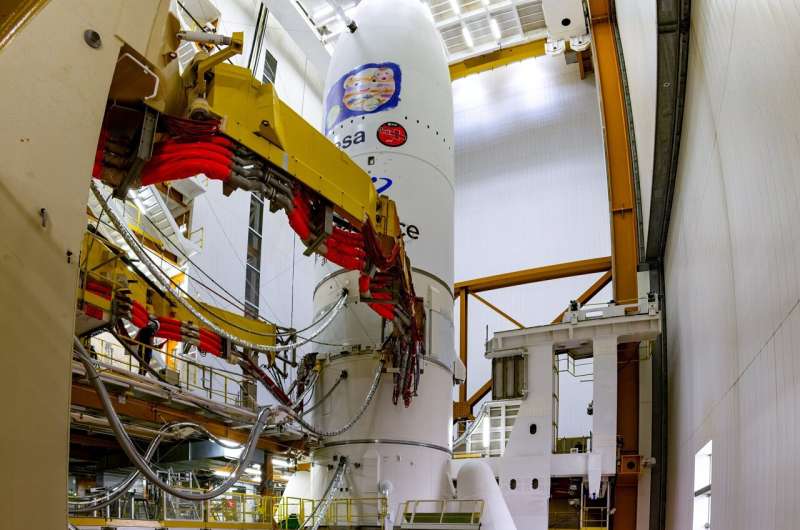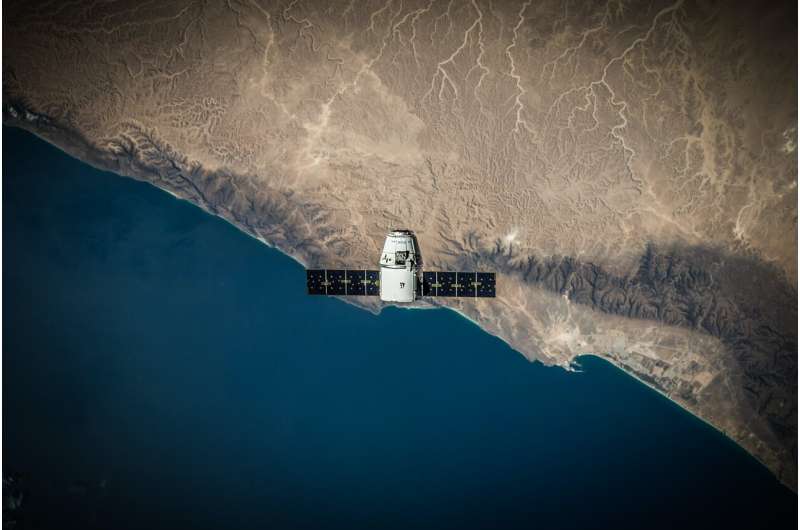China's 3D printed afterburning liquid rocket engine tested during recent mission
Wednesday, 12 April 2023 02:25 Tianbing Technology has made a breakthrough in rocket technology with the successful first flight of the Tianlong-2 liquid carrier rocket. The rocket used the liquid oxygen kerosene engine TH-11V, which was independently developed by Tianbing Technology. This engine is the world's first closed-cycle supplementary combustion engine that uses 3D printing technology.
During the 285-second fli
Tianbing Technology has made a breakthrough in rocket technology with the successful first flight of the Tianlong-2 liquid carrier rocket. The rocket used the liquid oxygen kerosene engine TH-11V, which was independently developed by Tianbing Technology. This engine is the world's first closed-cycle supplementary combustion engine that uses 3D printing technology.
During the 285-second fli NASA Boosts Open Science through Innovative Training
Wednesday, 12 April 2023 02:25 NASA is awarding a total of $6.5 million to U.S. institutions for education and training in open science. The promise of open science is that NASA research and data should be more collaborative, accessible, inclusive, and transparent for everyone from the scientist and student to the city manager and citizen.
The agency's Open-Source Science Initiative (OSSI) is promoting change in the ope
NASA is awarding a total of $6.5 million to U.S. institutions for education and training in open science. The promise of open science is that NASA research and data should be more collaborative, accessible, inclusive, and transparent for everyone from the scientist and student to the city manager and citizen.
The agency's Open-Source Science Initiative (OSSI) is promoting change in the ope Rocket Lab moves CubeSat from Virginia to New Zealand
Wednesday, 12 April 2023 02:25 Aerospace manufacturer Rocket Lab announced that it is moving its planned launch of NASA storm-monitoring CubeSats from Virginia to New Zealand.
The company said Monday that the two launches, which had been scheduled to take place at the company's launch complex in Wallops Island, Va., will instead be moved to Mahia, New Zealand.
The first launch is scheduled for no earlier than
Aerospace manufacturer Rocket Lab announced that it is moving its planned launch of NASA storm-monitoring CubeSats from Virginia to New Zealand.
The company said Monday that the two launches, which had been scheduled to take place at the company's launch complex in Wallops Island, Va., will instead be moved to Mahia, New Zealand.
The first launch is scheduled for no earlier than Curiosity software upgrade complete: Sol 3796
Wednesday, 12 April 2023 02:25 As Ken noted in his recent blog, our beloved rover spent much of the last week completing a software upgrade while the science team met virtually to synthesize and discuss results.
That upgrade has been completed successfully, and Curiosity was back to work characterizing a local canyon in an effort to study the composition and sedimentology of the geologic units above "Tapo Caparo." While
As Ken noted in his recent blog, our beloved rover spent much of the last week completing a software upgrade while the science team met virtually to synthesize and discuss results.
That upgrade has been completed successfully, and Curiosity was back to work characterizing a local canyon in an effort to study the composition and sedimentology of the geologic units above "Tapo Caparo." While Exceeding 20 Million: LAMOST Releases Its DR10 Data
Wednesday, 12 April 2023 02:25 The LAMOST DR10 (v1.0 version) dataset was officially released to domestic astronomers and international partners on March 31, 2023. This dataset contains more than 22.29 million spectra, which is 2.9 times the sum of the spectra released by all other survey projects in the world. LAMOST has become the first survey project with released spectra exceeding 20 million.
The DR10 dataset is a c
The LAMOST DR10 (v1.0 version) dataset was officially released to domestic astronomers and international partners on March 31, 2023. This dataset contains more than 22.29 million spectra, which is 2.9 times the sum of the spectra released by all other survey projects in the world. LAMOST has become the first survey project with released spectra exceeding 20 million.
The DR10 dataset is a c Viasat real-time Earth antennas integrated on Microsoft Azure Orbital
Wednesday, 12 April 2023 02:25 Viasat Inc. (NASDAQ: VSAT), a global communications company, has announced through a collaboration with Microsoft Azure Orbital, the global Viasat Real-Time Earth (RTE) ground service is now accessible through the Azure marketplace. Five RTE sites will be equipped with high-speed connectivity directly to the Azure cloud platform.
Satellite operators are able to schedule passes on RTE anten
Viasat Inc. (NASDAQ: VSAT), a global communications company, has announced through a collaboration with Microsoft Azure Orbital, the global Viasat Real-Time Earth (RTE) ground service is now accessible through the Azure marketplace. Five RTE sites will be equipped with high-speed connectivity directly to the Azure cloud platform.
Satellite operators are able to schedule passes on RTE anten New findings that map the universe's cosmic growth support Einstein's theory of gravity
Wednesday, 12 April 2023 02:25 For millennia, humans have been fascinated by the mysteries of the cosmos. Unlike ancient philosophers imagining the universe's origins, modern cosmologists use quantitative tools to gain insights into the universe's evolution and structure. Modern cosmology dates back to the early 20th century, with the development of Albert Einstein's theory of general relativity.
Now, researchers from t
For millennia, humans have been fascinated by the mysteries of the cosmos. Unlike ancient philosophers imagining the universe's origins, modern cosmologists use quantitative tools to gain insights into the universe's evolution and structure. Modern cosmology dates back to the early 20th century, with the development of Albert Einstein's theory of general relativity.
Now, researchers from t Space Force to propose plan to acquire high-capacity satellite communications
Wednesday, 12 April 2023 00:10
In an effort to keep up with the ever-increasing demands of U.S. military services, the Space Force will propose a new plan to acquire high-capacity satellite communications.
FCC launches space-focused bureau
Tuesday, 11 April 2023 21:43
The Federal Communications Commission established a standalone Space Bureau April 11 to be led by Julie Kearney, a law and policy veteran tasked with spearheading its efforts to modernize satellite regulations.
Ariane 5 flight VA260, carrying the Juice mission, is fully integrated and ready for rollout
Tuesday, 11 April 2023 16:49
Ariane 5 for flight VA260 carrying ESA's Juice mission is seen here fully integrated and ready for rollout for its planned April 13, 2023 launch from Europe's Spaceport in French Guiana.
Juice—JUpiter ICy Moons Explorer—is humankind's next bold mission to the outer solar system. After an eight-year journey to Jupiter, it will make detailed observations of the gas giant and its three large ocean-bearing moons: Ganymede, Callisto and Europa.
This ambitious mission will characterize these moons with a powerful suite of remote sensing, geophysical and in situ instruments to discover more about these compelling destinations as potential habitats for past or present life. Juice will monitor Jupiter's complex magnetic, radiation and plasma environment in depth and its interplay with the moons, studying the Jupiter system as an archetype for gas giant systems across the universe.
Provided by European Space Agency
In booming satellite market, micro-rockets are the next big thing
Tuesday, 11 April 2023 13:08
More and more miniature satellites are being launched every year, driving up demand for smaller rockets.
Contemporary life would hardly be possible without satellites. Much of what people do on Earth today relies heavily on what's happening high above their heads—from monitoring wildfires, deforestation and sea-surface temperatures to enabling connections to new mobile technologies like 5G in hard-to-reach areas.
A recent wave of cheaper, miniature satellites being sent into low orbits of 500 to 1,000 kilometers above Earth by the likes of Elon Musk's SpaceX and UK-based OneWeb signals a growing trend.
Less is more
With some tracking the globe's whole landmass and providing unprecedented detail, these satellites can be the size of a shoebox or even smaller.
Next O3b mPower satellites en route to launchpad
Tuesday, 11 April 2023 13:01
A second pair of O3b mPower satellites for upgrading SES’ medium Earth orbit broadband network are due to arrive at their SpaceX launchpad in Florida this week, Boeing announced April 11.
Op-ed | Practical applications of a space mission authorization framework
Tuesday, 11 April 2023 12:36
The National Space Council recently completed three public listening sessions on the issue of In-Space Authorization and Supervision, often described broadly as mission authorization.
Ball taps Loft and Microsoft for SDA NExT program
Tuesday, 11 April 2023 12:00
Ball Aerospace announced plans April 11 to work with Loft Federal and Microsoft’s Azure Orbital on the Space Development Agency’s National Defense Space Architecture Experimental Testbed program.
Virgin Orbit seeking expedited bankruptcy sale
Tuesday, 11 April 2023 10:57
Virgin Orbit is proposing a rapid sale of the company or its assets in bankruptcy, hoping to conclude the process before the end of May.

